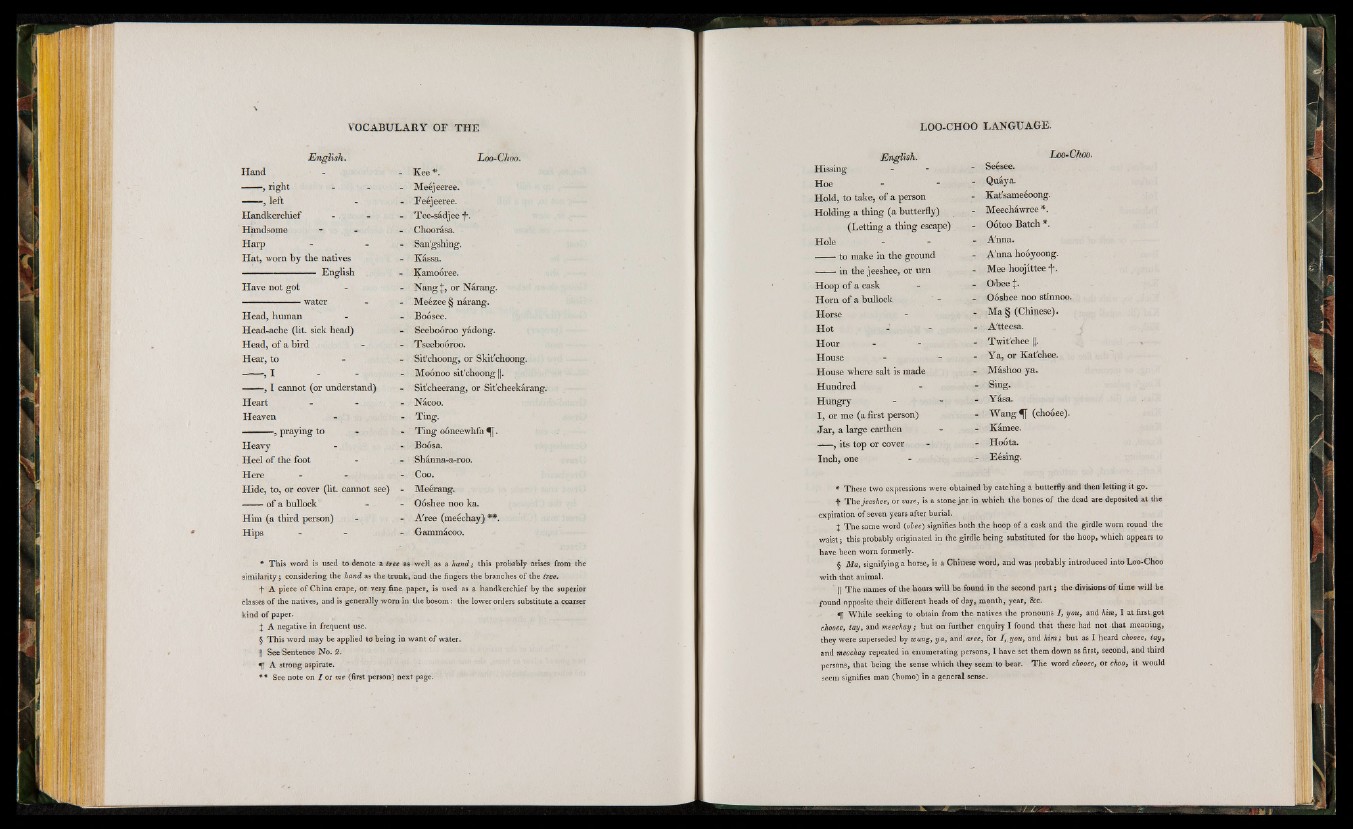
En g lish . Loo-Choo.
Hand Kee *.
------ , right I p Medjeeree.
------ , left - Fedjeeree.
Handkerchief Tee-s&djee *f*.
Handsome Choor&sa.
Harp San'gshing.
Hat, worn by the natives K&ssa.
---------------------- English 8 Kamooree.
Have not got - Nang J, or N&rang.
----------------- water - Meezee § n&rang.
Head, human - Boosee.
Head-ache (lit. sick head) m i Seebodroo y&dong.
Head, of a bird Tseebo6roo.
Hear, to - Sit'choong, or Skit'choong.
------ , I - ‘ -;v t - Mo6noo sit'choong ||.
■ - ■, I cannot (or understand) - Sitcheerang, or Sit'cheekdrang.
Heart - Ndcoo.
Heaven m Ting.
m Ting ooneewhfa^y.
Heavy i f i Bodsa.
Heel of the foot Shanna-a-roo.
Here - Coo.
Hide, to, or cover (lit. cannot see) - Meerang.
------ of a bullock Ooshee noo ka.
Him (a third person) - A'ree (meechay) **.
Hips - Gammdcoo.
* This word is used to denote a tree as weHas a hand; this probably arises from the
similarity; considering the hand as the trunk, and the fingers the branches of the tree.
f- A piece of China crape, or very fine paper, is used as a handkerchief by the superior
classes of the natives, and is generally worn in the bosom: the lower orders substitute a coarser
kind of paper.
X A negative in frequent use.
§ This word may be applied to being in want of water.
|] See Sentence No. 2.
«f[ A strong aspirate.
** See note on I or me (first person) next page.
English. Loo- C
Hissing - Seesee.
Hoe - Qu&ya.
Hold, to take, of a person - Kat'sameeoong.
Holding a thing (a butterfly) . - Meech&wree*.
(Letting a thing escape) - Odtoo Batch *.
Hole - A'nna.
------ to make in the ground - A'nna hooyoong.
------ in the jeeshee, or urn - Mee hoojittee -|*.
Hoop of a cask - Obee J.
Horn of a bullock - Ooshee noo stinnoo.
Horse - Ma§ (Chinese).
Hot - A'tteesa.
Hour - Twit'chee |J.
House - Ya, or Kat'chee.
House where salt is made - Mdshoo ya.
Hundred - Sing.
Hungry - Y&sa.
I , or me (a first person) - Wang (chooee).
Ja r, a large earthen - Kdmee.
——, its top or cover - Hoota.
Inch, one - Eesing.
* These two expressions were obtained by catching a butterfly and then letting it go.
f The jeeshee, or vase, is a stone jar in which the bones of the dead are deposited at the
expiration of seven years after burial.
X The same word (olee) signifies both.the hoop of a cask and the girdle worn round the
waist; this probably originated in the girdle being substituted for the hoop, which appears to
have been worn formerly.
§ Ma, signifying a horse, is a Chinese word, and was probably introduced intoLoo-Choo
with that animal.
* || The names of the hours will be found in the second part; the divisions of time will be
found opposite their different heads of day, month; year, &c.
While seeking to obtain from the natives the pronouns I, you, and him, I at first got
chooee, tay, and meechay ; but on further enquiry I found that these had not that meaning,
they were superseded by tvang, ya, and aree, for I,.you, and him’, but as I heard chooee, tay,
and meechay repeated in enumerating persons, 1 have set them down as first, second, and third
persons, that being the sense which they seem to bear. The word chooee, or choo, it would
seem signifies man (homo) in a general sense.